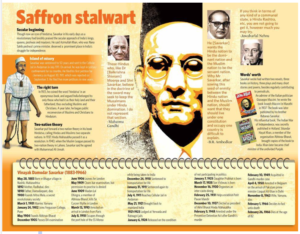The Big Picture- RSTV
Veer Savarkar
Archives
TOPIC: General Studies I
- Modern Indian history from about the middle of the eighteenth century until the present- significant events, personalities, issues.
In News: The Maharashtra BJP’s manifesto for the October 21 assembly elections had said the party will ask the NDA government at the Centre to confer India’s highest civilian award on Veer Savarkar and social reformers Jyotiba Phule and Savitribai Phule. Savarkar is considered to be among the prominent ideologues of the Rashtriya Swayamsevak Sangh (RSS).
Addressing an election rally in Akola district in Maharashtra, PM Modi said, “It is due to Savarkar’s sanskar (values) that we put nationalism as the basis for nation-building.”
Speaking at an event in Varanasi, Amit Shah said, “Had it not been for Veer Savarkar, the rebellion of 1857 would not have become history, we would have seen it from the point of view of Britishers. Veer Savarkar was the one who named the 1857 rebellion as the first independence struggle.”
Reactions
Former Prime Minister Manmohan Singh, at a press conference in Mumbai last week, had said, “We are not against Savarkar ji, but we are not in favour of the Hindutva ideology that Savarkar ji patronised and stood for either.”
The Congress said it wants to know if it also plans confer the country’s highest civilian award (Bharat Ratna) on Mahatma Gandhi’s assassin Nathuram Godse. Congress spokesman Manish Tewari said the BJP-led government needs to seriously think about the path it wants to take on the issue in the 150th year of Mahatma Gandhi’s birthday. He said Savarkar was tried (and later acquitted) in the Mahatma Gandhi assassination case and an inquiry commission had found that possibly he and some of his colleagues had prior knowledge of the plot.
Vinayak Damodar Savarkar
Period: 28 May 1883 – 26 February 1966
Cause of Death: Fasting (Sallekhana Prayopavesa)
He was commonly known as Veer Savarkar (“brave” in his native Marathi language)
- An Indian independence activist, politician, lawyer, writer, and the formulator of the Hindutva philosophy
- Championed atheism and rationality and also disapproved orthodox Hindu belief. In fact, he even dismissed cow worship as superstitious. Savarkar was a radical and his Hindutva too was a radical break in the Hindu thought: anti-caste, reformist, modernist and futuristic. It was a modern Hindu response to the modern world
- Organised a youth group named ‘Mitra Mela’
- In London, Veer Savarkar inspired his fellow Indian students and formed an organisation ‘Free India Society’ to fight against Britishers for freedom.
- Was against foreign goods and propagated the idea of Swadeshi. In 1905, he burnt all the foreign goods in a bonfire on Dussehra.
- Provided legal defence to Madan Lal Dhingra, who was accused in a murder case of a British Indian army officer named Sir William Hutt Curzon Wyllie.
- Veer Savarkar also founded the two-nation theory in his book ‘Hindutva’ calling Hindus and Muslims two separate nations. In 1937, Hindu Mahasabha passed it as a resolution. In 1937, he also became the president of ‘Hindu Mahasabha’.
- A fierce critic of the Indian National Congress (INC) and Mahatma Gandhi; opposed the ‘Quit India Movement’ and later objected to INC’s acceptance of Indian partition. He proposed the co-existence of two nations in one country.
Hindutva
The main challenge thrown by the British rule and colonial modernity under the pale of capitalism was for Hindus to justify their existence as a society. Who were they? Could Hindus survive in a modern world dominated by the expansionist organised religions, nations and nation-state?
Savarkar responded to these challenges. The coming together of various pagan traditions as Hinduism to meet the challenge of the Abrahamic monotheism is a centuries-old process. Savarkar consolidated it under a new ideological construct. He wielded it into a coherent political construct, Hindutva that aimed to answer the challenges of the modern world, especially the charge of the colonialists that India is not a nation and hence unworthy of self-rule.
For India to be able to resist imperialism, a nation had to be born. For Savarkar, that nation was a Hindu Rashtra. Only a Hindu nation transcending caste, regional and linguistic barriers was capable of resisting imperialism. No longer would invading armies roam around the countryside; no longer would India be a playground for colonial powers; no longer would its people and cities be pulverised by warlords for they would have to face a powerful Indian state created on the foundation of a Hindu nation. And the foundation of this Hindu nation was Hindutva.
Savarkar was a radical and his Hindutva, too, was a radical break in Hindu thought: anti-caste, reformist, modernist and futuristic. It was a modern Hindu response to the modern world.
50 years of imprisonment – Kaala Paani
- Savarkar wrote a book titled “The History of the War of Indian Independence”- wrote about the guerilla warfare tricks used in 1857 Sepoy Mutiny.
- While the book was banned by Britishers, Madama Bhikaji Cama published the book in Netherlands, Germany and France, which eventually reached many Indian revolutionaries.
- Savarkar was arrested in 1909 on charges of plotting an armed revolt against the Morle-Minto reform. He also tried to escape by diving in the water but was arrested. He was sentenced to two life sentences i.e. 50 years in the cellular jail of Andamans, also known as Kala Pani, in 1911.
Death – 1964: Savarkar declared his wish to attain Samadhi and started hunger-strike on February 1, 1966 and passed away on February 26, 1966. He believed that his purpose of life is solved as India has gained Independence.
In 2002, Port Blair airport at Andaman and Nicobar’s Island was renamed after Veer Savarkar International Airport.

RSTV IAS UPSC – Veer Savarkar











